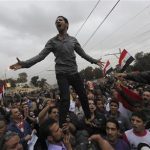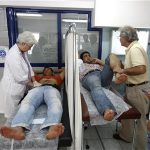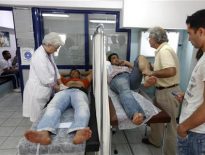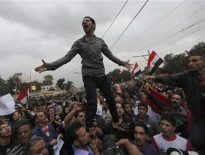(Reuters) – Artyom Kolpakov has learnt not to hope for too much after an exhilarating but ultimately frustrating year of protests against Russian leader Vladimir Putin.

Seething with anger over suspected fraud in a parliamentary election, the 39-year-old businessman ignored his wife’s pleas to stay at home on Dec 5 last year and joined a rally in Moscow’s Chistiye Prudy area where people chanted “Revolution!”
The demonstration, at which police made dozens of arrests, touched off the biggest wave of protests against the former KGB spy since he was first elected president in 2000.
For a few weeks, the mainly young, urban and middle-class protesters dared hope that Putin’s days in power were numbered. Even in the heart of winter, the biggest rallies drew tens of thousands of people shouting “Russia without Putin!”.
A year on, Putin is back in the presidency after four years as premier, the opposition is divided and the protests have lost momentum after failing to take off in the provinces, where the president’s support is traditionally stronger.
“There’s no longer anything revolutionary in the rallies like there was back then, when they were spontaneous, like at Chistiye Prudy,” Kolpakov said.
“It was stupid to ever think that everything would change (because of the protests). Breaking something down does not mean building something else. Building something is much harder.”
But Kolpakov, who runs a small recording studio, still plans to attend an “anniversary” march on December 15 to show solidarity with a cause that he believes has unlocked the door to change in Russian society however slow it may be in fully opening.
Putin’s opponents say his authority is gradually being eroded as he struggles to find a new direction or a “big idea” to push Russia forwards and strengthen his grip on power.
“Peaceful protests are all we have at our disposal. You can feel the mood of society and Putin’s ratings are falling. It’s clear that now he’s got to do something to respond,” Kolpakov said.
EVOLUTION, NOT REVOLUTION
The rally on December 5, 2011 was the biggest opposition protest in years. It spawned a larger rally five days later as outrage grew over the police intervention and over concerns that vote-rigging may have helped Putin’s United Russia win the election.
Anti-corruption blogger Alexei Navalny missed the second protest because he had been sentenced to 15 days in jail for resisting the police at the first demonstration.
But he was back for the next rallies and established himself as the most prominent of the motley group of opposition leaders.
His message now is that change will come slowly. The opposition mantra is evolution, not revolution.
“It is clear that Putin’s regime is not giving up and will not give up, that he will push back against us and is willing to resort to repression,” Navalny said on the sidelines of an opposition meeting.
“But over the past year the situation in the country has changed completely … Tens, even hundreds of thousands of people are involved in protest activities, and we could not have imagined this a year ago. I still believe we are on the threshold of major changes and all we’ve done was not in vain.”
Few Russians would dispute the fact that the protests have accelerated the birth of a civil society in Russia two decades after the collapse of the Soviet Union, particularly in big cities such as Moscow.
Hundreds of interest groups have sprung up, some of them defending citizens’ rights on single issues and others opposition-minded discussion groups.
The protests initially forced the Kremlin into concessions, letting more parties register and restoring the election of regional governors who had previously been appointees. But critics say the Kremlin used fine print and political muscle to limit the effects of the reforms.
Putin was elected to a six-year third term in March and the parliament, dominated by his party, has pushed through laws which critics say can be used to stifle dissent – tightening controls of the Internet, imposing new checks on foreign-funded lobby groups and broadening the definition of treason.
Several leaders face what they say are politically motivated criminal charges intended by the Kremlin to limit their opposition activities. Navalny, for example, could be jailed for up to 10 years if found guilty of charges of stealing timber from a state firm.
Regional elections in October tightened Putin’s hold on power and underlined the opposition’s failure to build the street protests into an effective challenge. They have all but no seats in parliament.
“FIRST GRADERS”
The Kremlin, perhaps with bravado and certainly with relief after a tricky start to 2012 when the protests were at their peak, says it does not regard the opposition as a big threat.
“Fortunately, there will be no revolution in Russia. There are simply not enough young people,” said Konstantin Kostin, a former Kremlin political aide who still advises the president in his role as head of a political think tank.
He dismissed the opposition leaders as “first-grade kids.”
“I always tell our ‘revolutionaries’: Don’t fool around, go and take part in the election, so that in seven or eight years you can make a serious election bid,” Kostin said.
The Kremlin has denied launching a political clampdown on the opposition and accused foreign governments, including the United States, of meddling in Russia’s domestic affairs.
Most Russian media have remained loyal to the Kremlin, preventing the opposition gaining regular access to a mass audience except on the Internet.
The opposition has at times shot itself in the foot and played into the Kremlin’s hands, by arguing in public.
Although it tries to present a united front, the opposition includes nationalists, liberals, ecologists and leftists and its leaders have failed to unite on much except a desire to oust Putin. Even agreement on a date, venue and slogans for rallies has often proved difficult at chaotic opposition meetings.
Clashes with police at a rally on May 6, the eve of Putin’s inauguration, further damaged the opposition’s image and scared some supporters away from later rallies as attendance dwindled.
Some Russians even blame the opposition for new fractures in society, especially since the trial of the all-women punk band Pussy Riot over its profane protest in a Russian Orthodox Church over Putin’s ties with the clergy.
A majority of Russians opposed the protest even though many disapproved of the two-year jail sentences handed down to two of the band’s members. The case came to embody the gulf between liberal and conservative Russians.
PUTIN’S PROBLEMS
But opposition leaders are also encouraged by the decline in Putin’s own image. At 60, he is an object of biting satire after almost 13 years in power and has a back problem which has undermined his macho image.
Many foreign investors continue to be hesitant about investing in Russia, which is heavily dependent on the price of energy exports remaining high, and are worried by issues such as corruption and the weak rule of law.
Many rich Russians continue to show their own worries by taking their money out of the country. Capital flight is running at about the same rate as last year, when it reached $84.2 billion, the Central Bank said last month.
Putin portrays himself as a patriot defending Russia’s interests and has overseen several high-profile anti-corruption cases in a campaign that appears intended to win votes in a country where corruption is seen as one of the biggest problems.
But a new opinion poll by the independent Levada research group showed Putin’s approval rating had fallen from 67 percent to 63 percent, a sign that many are skeptical about the true intention of the anti-graft campaign and how far it will go.
Such polls give the opposition hope.
“We are living in a very dynamically changing situation. A lot of the people who have fallen out of love with Putin are not going to fall in love with him again,” Ksenia Sobchak, a socialite turned opposition figure, said in London on Monday.
“And despite the tough period that lies ahead, this is an inevitable process towards success.
(Additional reporting by Gleb Bryanski, Maria Golovnina, Steve Gutterman and Gabriela Baczynska; editing by Anna Willard)





